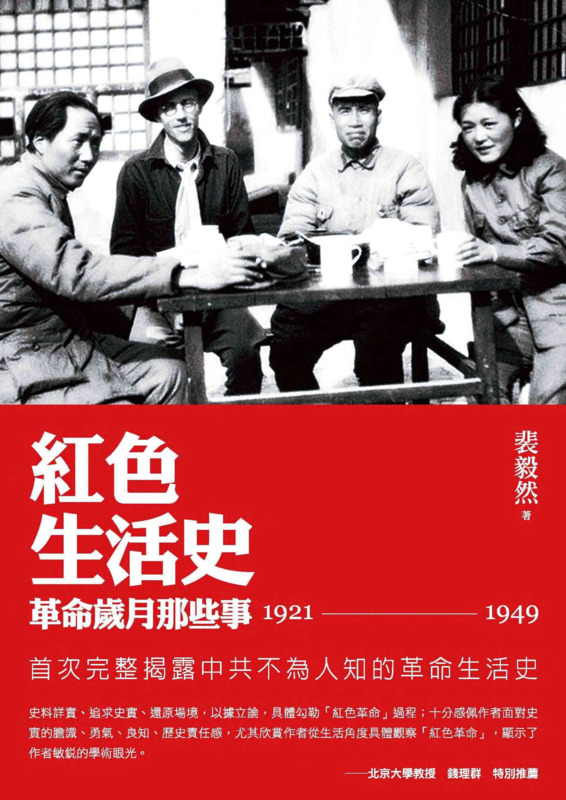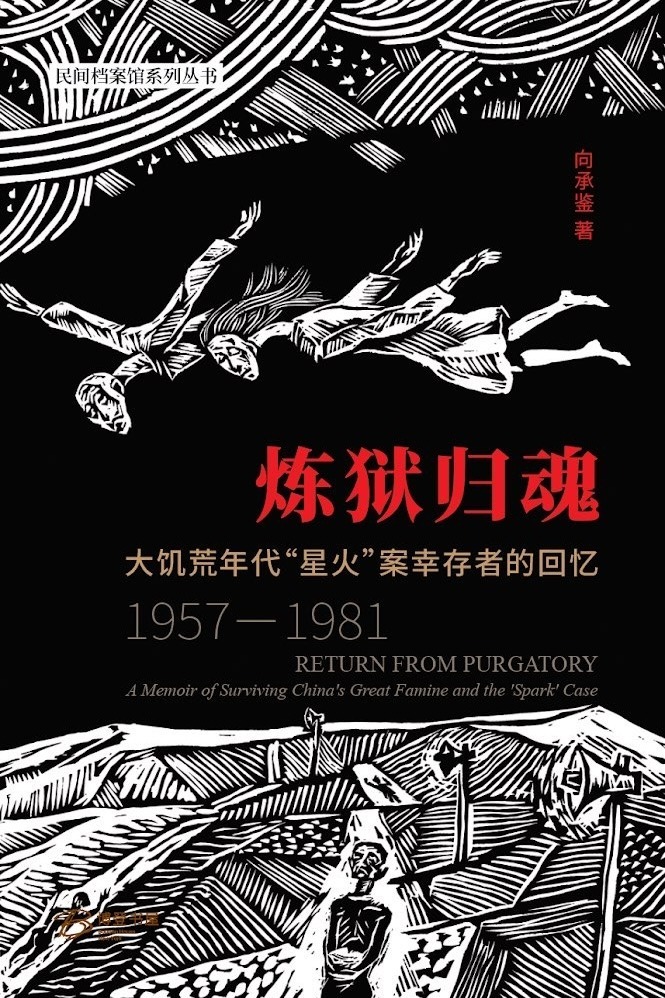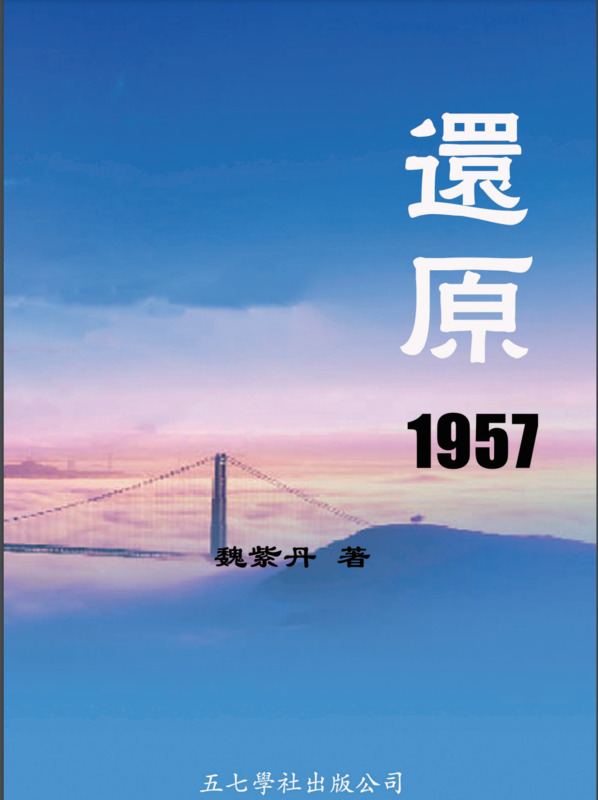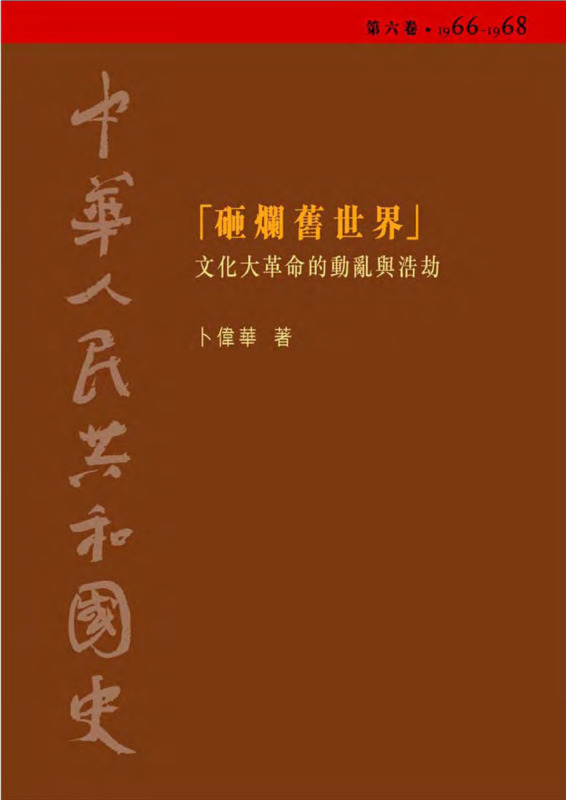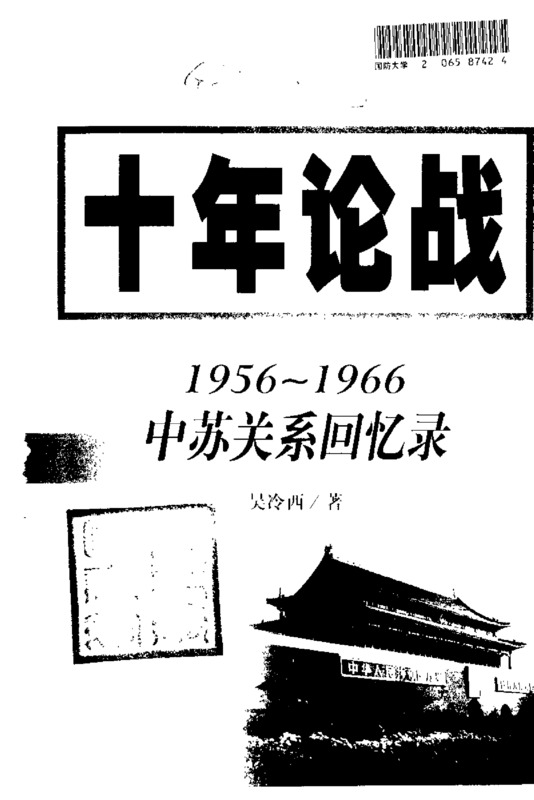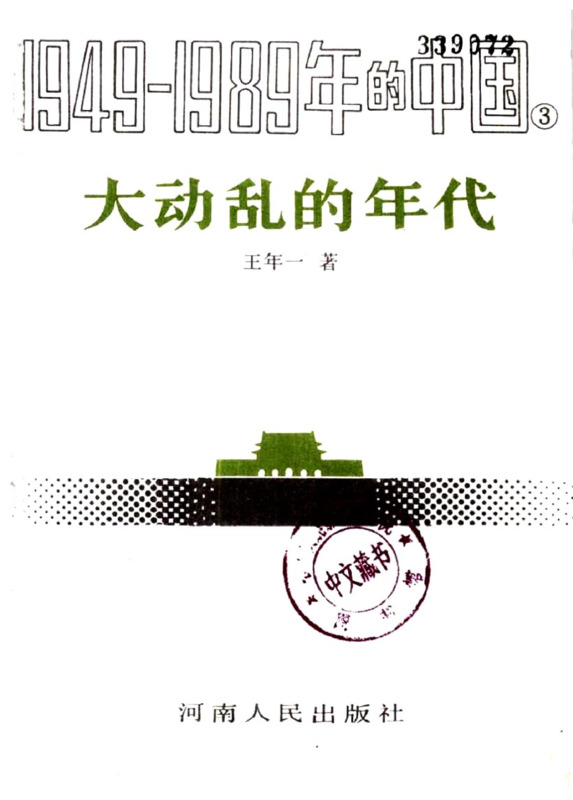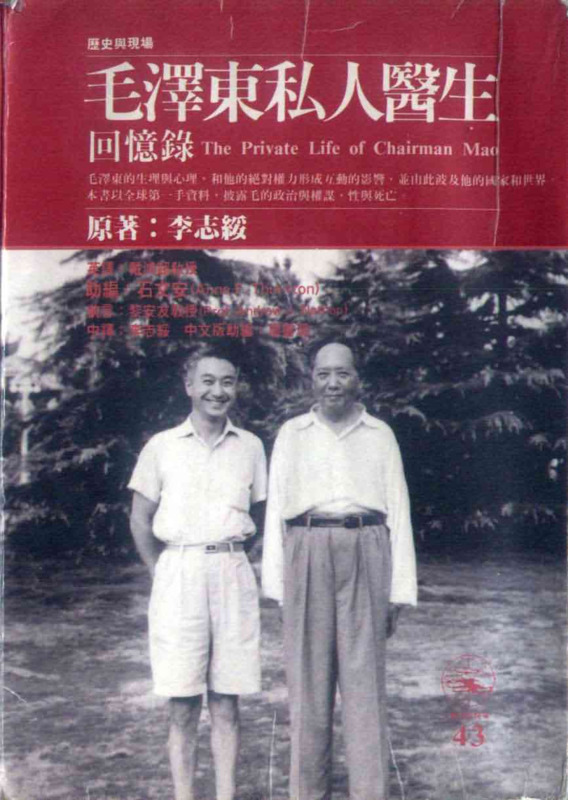Explore the collection
Showing 77 items in the collection
77 items
Book
Red Life History - The Revolutionary Years (1921-1949)
Professor Pei Yiran's book is the first complete revelation of the untold revolutionary history of the CCP. The book covers many important points in the history of the CCP, including the use of Soviet rubles to build the party, the landlords fundraising campaign, and the love life of Mao Zedong and Jiang Qing, among subjects.
book
Return of the Soul from Purgatory: Memoirs of a Survivor of the "Sparks" Case from the Great Famine Era
In 1960, a group of faculty and students from Lanzhou University, who had been labeled Rightists and sent down to rural areas in Tianshui, Gansu, personally experienced the Great Famine. They self-published <i>Spark</i> magazine to expose and criticize the totalitarian rule that led to this catastrophe.<i>Spark</i> only published one issue before its participants were arrested and labeled as a counterrevolutionary group. Many were sentenced to long prison terms, and some were even executed. <a href=“http://108.160.154.72/s/china-unofficial/item/1759#lg=1&slide=0”>The first issue of <i>Spark</i> and more information about the "Spark Case" can be read here</a>.
<i>Return from Purgatory: A Survivor’s Memoir of the ‘Spark Case’ in the Great Famine Years (1957–1981)</i> is the autobiography of Xiang Chengjian, a key participant in <i>Spark</i> magazine. At the time, he and another student were responsible for printing the first issue, and he contributed six articles to <i>Spark</i>. Due to his involvement, he was sentenced to 18 years in prison for his role in the Spark case and was not rehabilitated until the early 1980s.
This memoir is divided into three sections, with a total of thirteen chapters spanning over 350,000 characters. It documents Xiang’s journey from being labeled a Rightist and sent to perform forced labor, to his arrest and 19-year imprisonment for his involvement in <i>Spark</i>, and finally to his struggle for rehabilitation and efforts to rebuild his life after release. In the book’s preface, scholar Ai Xiaoming offers the following assessment:
"Xiang Chengjian’s memoir holds significant value for the study of the intellectual history of contemporary China. First, it serves as another important testimony of the “Spark Case”, following Tan Chanxue’s memoir <i><a href=“”>Sparks: A Chronicle of the Rightist Counter-Revolutionary Group at Lanzhou University</a></i>, making it a crucial historical document on this act of resistance. The author reconstructs the social context before and after the case and describes how the young intellectuals behind <i>Spark</i> bravely challenged totalitarian rule. Second, the book provides a detailed account of labor camps in western China, with the author documenting his 18 years of forced labor in Gansu and Qinghai, unveiling a western chapter of China’s Gulag system. Third, it is a deeply personal intellectual history of a resister, showing the immense suffering, trials of life and death, and personal resilience under the crushing force of state violence."
The book’s appendix includes Xiang Chengjian’s six articles for <i>Spark</i>, an in-depth investigative report on him by journalist Jiang Xue, and a chronological record of the Spark Case compiled by Ai Xiaoming.
<i>Return from Purgatory</i> is published by Borden Press in New York and is the first book in the “People’s Archives Series”, published by the China Unofficial Archives. The author, Xiang Chengjian, has generously authorized the archive to share the book’s digital edition. Readers are encouraged to purchase the book to support the author and publisher.
Book
Revisiting 1957
<i>Revisiting 1957</i> is not just about the history of the Anti-Rightist Campaign but is also a theoretical reflection on that history. Written by Wei Zidan (the penname for Wei Liyan), the book has three sections: upper, in which the author discusses philosophical problems of the campaign; middle, in which he discusses the origins of the campaign; and lower, which contains his thoughts on lessons for the future. In Wei's view, the people who were declared rightists stood up for freedom of speech. The campaign, therefore, was an assault on freedom of expression and resulted in a human rights catastrophe for China. The book also has an eleven-part appendix with reflections on miscellaneous events.
Wei Zidan was born in Henan Province in 1933 and was a teacher in the Anyang Middle School. He himself was labeled a rightist and brings a unique insider's account of the movement but unlike some personal accounts of suffering, Wei also brings a more analytical approach to the issue.
After moving to the United States in his later years, he collected information and found the freedom to complete this book. Published in Hong Kong in 2013 by the May 7 Society Press.
Book
Seventy Years of the Chinese Communist Revolution
Professor Chen Yongfa's book examines the history of the Chinese Communist Party from the perspective of modern Chinese history. It divides it into three stages: revolutionary seizure of power, continuous revolution, and farewell revolution. It delves into three major issues in CCP history: nationalism, grassroots power structure, and ideological transformation and control. published by Taiwan's Linking Publishing in 2001.
Book
Smashing the Old World: The Turmoil and Havoc of the Cultural Revolution
This volume is authored by Bu Weihua. Bu Weihua was the originator of the Red Guards and the Red Guard movement. He became a member of the Red Guards at Tsinghua High School. After the end of the Cultural Revolution, he received professional training in history and was one of the first scholars in China to engage in the study of the Cultural Revolution. He not only understands the pre-Cultural Revolution period, especially the Red Guard movement in Beijing, but also has deep reflections on the catastrophe he experienced. This volume concisely depicts the panoramic images and processes of the Cultural Revolution from May 1966 to April 1969.
Film and Video
Spark
<i>Spark</i> tells the story of a group of young intellectuals who risked their lives to voice their opinions about the Chinese Communist Party in the 1950s and 1960s. Following the Hundred Flowers Campaign of 1957, many intellectuals were branded as Rightists and banished to work and live in rural China. A group of students from Lanzhou University were among those sent to the countryside. There, they witnessed mass famine which resulted from government policies to collectivize agriculture and force industrialization in rural China. Shocked and angered by the government’s lack of response to the Great Famine, these students banded together to publish <i>Spark</i>, an underground magazine that sought to alert the Chinese population of the unfolding famine. The first issue, printed in 1960, included poems and articles analyzing the root causes of failed policies. However, as the first issue of <i>Spark</i> was mailed and the second issue was edited, many of these students, along with locals who supported the team, were arrested. Some of the key members of the publication were sentenced to life imprisonment and later executed, while others spent decades in labor camps.
In this 2014 documentary, Hu Jie uncovers the stories of the people involved in the publication of <i>Spark</i>. He conducts interviews with former members of the magazine who survived persecution, and also shows footage of the manuscripts of the magazine. A digital copy of the original manuscript of the first volume of <i>Spark</i> is also held on our website.
This film was awarded the Special Jury Prize for Chinese Documentary at the 2014 Taiwan International Documentary Film Festival and the Award of Excellence in the Asian Competition. Later, it won the Independent Spirit Award at the Beijing Independent Film Festival.
Periodicals
Spark, Issue 1
<i>Spark</i> was an underground magazine that appeared in the Tianshui area of Gansu Province in northwestern China during the 1959-1961 Great Famine. The magazine was lost for decades but in the late 1990s began to be republished electronically, becoming the basis of documentary films, essays, and books.
In 1959, the Great Famine was spreading across China. It was witnessed by a group of Lanzhou University students who had been branded as Rightists and sent down to labor in the rural area of Tianshui. They saw countless peasants dying of hunger, and witnessed cannibalism.
Led by Zhang Chunyuan, a history student at Lanzhou University, they founded <i>Spark</i> in the hope of alerting people to the unfolding disaster and analyzing its root causes. The students pooled their money to buy a mimeograph machine, carved their own wax plates, and printed the first issue. The thirty-page publication featured Lin Zhao's long poem, "A Day in Prometheus's Passion." The first issue also featured articles, such as "The Current Situation and Duty," which dissected the tragic situation of society at that time and hoped that the revolution would be initiated by the Communist Party from within.
The students planned to send the magazine to the leaders of the provinces and cities with a view to correcting their mistakes. But before the first issue of Spark was mailed and while the second issue was still being edited, on September 30, 1960, these students in Wushan and Tianshui were arrested, along with dozens of local peasants who knew and supported them. Among them: Zhang Chunyuan was sentenced to life imprisonment and later executed; Du Yinghua, deputy secretary of the Wushan County Committee of the Chinese Communist Party, was sentenced to five years' imprisonment for having interacted with the students, and later executed. Lin Zhao was detained and also executed. Other key members, such as Gu Yan, Tan Chanxue, and Xiang Chengjian, were all sentenced to long years in labor camps.
In the 1990s, Tan Chanxue devoted herself to researching historical information and figures to bring this history to life. She found in her personnel file (<i>dan'an</i>)photographs of the magazine, as well as self-confessions and other evidence used in the students' trial. Eventually, the photos were collated into PDFs, which began to circulate around China.
Editors' note: This site the original handwritten version and a PDF of all the articles from the first issue of <i>Spark</i>. We will also make available transcripts of the essays in Chinese and are searching for volunteers to translate the texts into English. Please contact us if you're interested in helping!
Book
Summer of 1957: From One Hundred Schools of Thought to Two Schools of Thought
This book comprehensively records and analyzes the Anti-Rightist Campaign.
The author Zhu Zheng was born in 1931. He was once the editor of Hunan People's Publishing House and a well-known expert on Lu Xun in China. He was classified as a Rightist in 1957 and personally experienced the Anti-Rightist Campaign. This book references information from CCP party newspapers at that time, as well as his recollections, making this book informative and reliable.
The "two dueling schools of thought" in the subtitle of this book comes from The Selected Works of Mao Zedong. Mao called for one hundred schools of thought to contend but in fact only intended for two to compete: the bourgeoisie and the proletariat.
This book was first published by Henan People's Publishing House in 1998. It is one of the earliest studies of the movement in China.
Film and Video
Taishi Village
In the fall of 2005, residents of Taishi Village became increasingly frustrated and angered by the sale of land by village officials; hundreds of villagers signed a petition calling for the removal of the village chief. The villagers occupied the village committee’s financial office and expressed their demands through sit-ins and other forms of protests. The government dispatched the police to arrest village activists, but the villagers insisted on starting a formal recall process. The government finally sent a team to the village to verify the signatures for the petition.
<i>The Taishi Village</i> recall incident generated attention from Chinese and foreign media, and caused uneasiness among local government officials. On September 12, 2005, police arrested dozens of villagers who were participating in a sit-in in the village committee room. Despite the pressure, villagers elected a committee to remove the village committee director. The government then dispatched more men to exert pressure, forcing elected members to withdraw one by one. Hired patrol teams eventually drove lawyers and reporters out of the village.
This documentary records the protest scenes and tragic ending of Taishi village’s movement for autonomy, and presents the surging rights consciousness in rural areas in Guangdong. This incident demonstrates villagers’ ability to exercise their right to vote and the government’s inertial approach to grassroots democracy movements.
This documentary is in Chinese with Chinese subtitles.
Book
Ten Years of War: A Memoir of Sino-Soviet Relations 1956-1966
The author of this book explains the relations between the two parties before and after the 1956-1966 Sino-Soviet War and the main process of the Sino-Soviet War as a first-hand witness. Since Stalin's death and Khrushchev's rise to power, Sino-Soviet relations have been characterized by a series of exchanges over the internal relations between the socialist party and the socialist country, the relations with the "imperialists", how to build socialism, and the national question. As a personal witness to this period, the author tells the truth about history as he knows it. This book was originally published on the mainland in 1993.
Book
The Age of Great Unrest: China 1949-1989
The author of this book, Wang Nianyi (1932 - September 13, 2007), was an expert on the history of the Cultural Revolution. He has a clear understanding of the causes and circumstances of the Cultural Revolution. He is regarded as doing "pioneering work" in China's domestic study of the Cultural Revolution. According to Qizhi's recollection, Wang Nianyi compiled <i>Chronicle of the Cultural Revolution</i>, <i>The First Year of the Cultural Revolution</i>, <i>Dictionary of the Cultural Revolution</i>, <i>Miscellaneous Discourses on the Cultural Revolution</i>, and <i>Research Materials on the Cultural Revolution</i>, which have not been published in China.
Book
The Collected Works of He Jiadong
He Jiadong is a Chinese publisher. He joined the Chinese Communist Party at an early age. After 1949, he founded the Workers' Publishing House, one of the propaganda mouthpieces of the CCP. In 1957, he was designated as a rightist and later labeled as an anti-Party element. In 1965, Kang Sheng criticized him. He was sent down to Chengwu County in Shandong Province, where he was put under local control for 14 years. During the Cultural Revolution, he was taken back to Beijing and criticized, which affected his family and led to the unnatural death of his mother and two sons. In 1979, after the rightist was corrected and completely rehabilitated, he became the executive vice-president and deputy editor-in-chief of the Workers' Publishing House; in 1983, he founded the monthly <i>Rensheng (Life)</i>. In 1984, he founded <i>Kaituo (Pioneering)</i> magazine. He was investigated for publishing Liu Binyan's <i>The Second Kind of Loyalty</i>, and resigned from his post in 1985. The above weekly newspapers, bimonthly magazines and websites were all suspended and closed by the authorities. He has written a large number of articles exploring China's development path from the end of authoritarianism to constitutional democracy. He himself had a 60-year career as a "red publisher" but never had the freedom to publish. Even his own collection of essays was never published. Until the end of his life, he never saw a printed volume of his essays—the printed books were seized and confiscated by the Chinese authorities.
The book can be purchased <a href="https://www.fellowspress.com/shop1/p/-4"> link</a>.
Book
The Doubtful Clouds of 1957-- Cracking the Code of the Anti-Rightist Movement
The Anti-Rightist Movement in China began in 1957 with the reorganization of intellectuals, followed by the Great Leap Forward, the People's Commune, and a series of calamities such as the Great Famine. The Hong Kong Five Sevens Society was founded in 2007 with the aim of collecting, organizing, and researching historical information about the Anti-Rightist Movement. It is headed by Wu Yisan, a writer who moved to Hong Kong from mainland China. The author of this book, Shen Yuan, who was also a Rightist at the time. He has systematically researched and organized the Anti-Rightist Movement that took place in 1957 and attempted to answer some of the unanswered questions.
Book
The Goddess of Freedom of the Chinese Nation -- An Anthology of Essays in Honor of Lin Zhao 40 Years After Her Death
Lin Zhao, formerly known as Peng Lingzhao, a native of Suzhou, was admitted to the journalism department of Peking University in 1954, but was classified as a Rightist in 1957. She was arrested and imprisoned in October 1960 because of her involvement with the underground magazine <i>Spark</i>. In 1965, Lin Zhao was sentenced to 20 years' imprisonment for "counter-revolutionary crimes." On April 29, 1968, she was sentenced to death and executed on the same day at the age of 36. This book is a collection of more than sixty articles written in memory of Lin Zhao.
Book
The Great Leap Forward: An Intimate Memoir
Li Rui, who once served as Mao's secretary, is also an expert on Mao Zedong. Like his famous <i>Proceedings of the Lushan Conference</i>, this book is also an important historical work. It focuses on the author's personal experience of the Great Leap Forward initiated by Mao Zedong.
Film and Video
The Gulag Book
This movie records how Zhang Xianzhi went from being a soldier to a prisoner and then to an independent writer. His experience and thought process is compared with that of the Russian writer Solzhenitsyn. The title of the film is taken from the title of Zhang Xianzhi's book <i>Anecdotes from the Gulag</i>, which takes the viewer on a journey to China's Gulag Archipelago, a labor camp in Sichuan. The extreme conditions and little-known tragic history of the camp are presented. The movie is 42 minutes long and was filmed in 2012.
Book
The Herald of History: The Solemn Promise of Half a Century Ago
Compiled by the Sichuan writer Xiao Shu (b. 1962), this book offers a variety of pro-democracy statements released by the Chinese Communist Party media, including short commentaries, speeches, editorials, and documents from <i>Xinhua Daily, Jiefang Daily, Party History Bulletin</i>, and <i>People's Daily</i> from 1941 to 1946. The essays criticize the Kuomintang government for running a "one-party dictatorship" and promised freedom, democracy and human rights.
The book was published by Shantou University Press in 1999. <a href="https://archive.ph/20220329191611/https://www.rfi.fr/tw/%E4%B8%AD%E5%9C%8B/20130817-%E9%A6%99%E6%B8%AF%E5%A4%A7%E5%AD%B8%E5%86%8D%E7%89%88%E3%80%8A%E6%AD%B7%E5%8F%B2%E7%9A%84%E5%85%88%E8%81%B2%E3%80%8B">According to Xiao Shu</a>, the book was heavily criticized by the then-head of the Propaganda Department, Ding Guangen. The publishing house was temporarily suspended, and copies of the book were destroyed. It was republished in Hong Kong by the Bosi Publishing Group in 2002, and reprinted by the Journalism and Media Studies Center of the University of Hong Kong in 2013.
Book
The Private Life of Chairman Mao
Author Li Zhisui served as Mao's medical team leader and was the first director of the PLA's San 105 Hospital. This book is a memoir that he wrote. It details Li Zhisui's information from 1954, when he started as Mao's personal physician, to 1976, when Mao died, a period of 22 years. In his writing, Mao's private life is extremely absurd and touches on all aspects of the struggle against some of the CCP's personnel. After the book was published in Taiwan, it was completely banned on the mainland.
Originally written in English, the book was translated into English by Hongchao Dai, former head of the political science department at the University of Detroit, with a foreword by China expert Andrew James Nathan, and with Anne F. Thurston as an assistant editor. was published in English by Blue Lantern Books in 1994. The Chinese edition was translated from the English with the assistance of Shushan Liao and published by Taiwan Times Culture in 1994. Lee died in the United States in February 1995, six months after the book was published.
Book
The Realm of Historiography
This book is a compilation of some of Gao Hua's speeches, book reviews, commentaries on current affairs, reviews of student papers, and lecture transcripts. It includes his studies and reflections on themes around revolution, civil war, and nationalism, his comments on the works of Long Yingtai, Wang Dingjun, and Mao Zedong, and his observations on Taiwan's social and political realities during his visits to Taiwan. In addition, the book contains a selection of Gao Hua's lecture notes on the theory and methodology of historiographical research, as well as on the production of official historical narratives and the development of folk history, enabling readers to gain further understanding of the philosophy and methodology behind Gao Hua’s research.
The book was published by Guangxi Normal University Press in November 2015 before the fourth anniversary of Gao Hua's death, for which the publisher was disciplined by the Central Propaganda Department and the State Administration of Press, Publication, Radio, Film and Television.
